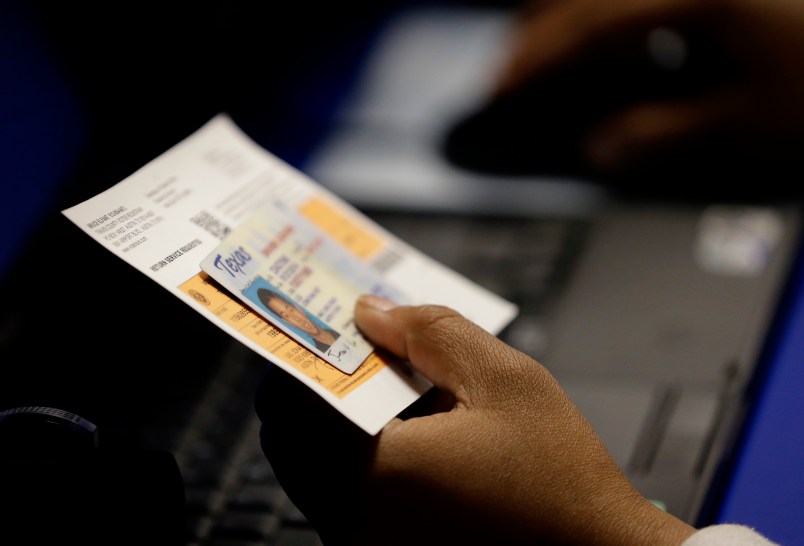A panel of one of the nation’s most notoriously conservative appeals courts in the country delivered a victory to voting rights activists. While the 5th U.S. Circuit Court of Appeals struck down Texas’ voter ID law — known as one of the strictest in the country — on narrow grounds Wednesday, it also set the stage for further challenges to restrictive voting laws under a crippled Voting Rights Act, which celebrated its 50th anniversary Thursday.
Critics have claimed that the types of identification Texas law required voters to present – allowing gun permits but not student ID cards, for instance – have made it harder for Democratic-leaning minority, younger and lower income people to vote.
Wednesday’s decision represented a blow to voter ID supporters, who say the restrictions are necessary to root out voter fraud. Voting rights activists seeking to challenge restrictive laws since the Voting Rights Act had been gutted by the Supreme Court in 2013 viewed the decision with encouragement.
“It’s a big deal because [the court] is using a portion of the Voting Rights Act – Section 2 – to invalidate it,” said Joshua Douglas — a University of Kentucky College of Law professor specializing in election law — referring to the grounds upon which the court called the law discriminatory in its effect.
“Critics of voter ID laws have been looking for valid ways to convince courts that these laws are unlawful,” Douglas said, especially since 2008, when the Supreme Court upheld Indiana’s voter ID law.
Wednesday’s decision narrowed a district court’s earlier ruling against the law, which had declared the law discriminatory in both its intent and effect, a poll tax, and an unconstitutional burden on the right to vote. The appeals court agreed that the law had a discriminatory effect in violation of Section 2 of the Voting Rights Act, but reversed the poll tax claim, and sent back the discriminatory intent finding to the district court for reconsideration with a much higher legal bar. It avoided the constitutional question entirely.
Rick Hasen, a professor at UC-Irvine School of Law who also runs the Election Law Blog, described it on his blog as “an opinion written as narrowly as possible to still give a victory to the plaintiffs.”
The federal appeals court urged Wednesday that “the parties to work cooperatively with the district court to provide a prompt resolution of this matter to avoid election eve uncertainties and emergencies.”
But it is more likely that the state will continue to fight the decision, considering how hard it had pushed to advance the legislation in the first place. Both the Department of Justice and the D.C. Circuit Court of Appeals refused to approve the 2011 legislation, as was required under the “preclearance” portion of the Voting Rights Act that was later rendered moot by the Supreme Court in 2013. After that decision, known as Shelby County v. Holder, Texas was allowed to implement the law.
Texas’ statement on Wednesday’s decision offered no hint of its next move other than that the state would “continue to fight” for the law. The state could appeal en banc, meaning to the all the justices on the 5th Circuit, or it could skip straight to the Supreme Court.
Douglas, who previously clerked for the 5th Circuit, says it’s more likely Texas will chose the latter, as the unanimous three-judge decision was written by Justice Catharina Haynes, a moderate conservative who was appointed by President George W. Bush.
“The fact that she wrote the opinion — which means she would almost definitely not vote to take it en banc — makes the en banc vote in the 5th Circuit harder,” Douglas said.
Despite its narrow tailoring, the decision was notable as being first time a federal appeals court ruled against a voter ID law on its merits (rather than for procedural reasons) since the Supreme Court upheld Indiana’s voter ID law, as Lyle Denniston at SCOTUSblog noted. Since that 2008 decision, voter ID laws implemented by states have become stricter in both the types of IDs allowed and the remedial protocols when someone lacks the proper ID.
Last year, the 7th U.S. Circuit Court of Appeals upheld Wisconsin’s voter ID law.
Furthermore, the case represents a significant victory for the Obama administration — which had put considerable weight behind the challengers — since the Shelby decision, which struck the formula determining which states must seek “preclearance” from the Justice Department or a federal court before enacting voting restrictions.
Attorney General Loretta Lynch said in a statement that she was “pleased” with Wednesday’s decision.
According to the Jennifer Clark, counsel for Democracy Program the Brennan Center for Justice at NYU School of Law, that the court chose to invalidate Texas’ law under Section 2 of the Voting Rights Act was good sign for those challenging restrictive voting laws elsewhere in the country.
“It is one of the first major decisions to speak about the ability of the Voting Rights Act to protect against the restrictive laws after the Supreme Court 2013 Shelby decision,” she told TPM.
Attention now is also on a challenge to a package of restrictive voting laws passed in North Carolina swiftly after the Shelby decision. The case recently concluded oral arguments in front of a district court.
The Supreme Court has yet to weigh in on Section 2’s scope as it pertains to laws said to deny people the right to vote, according to Douglas. (It has looked at Section 2 as it pertains to redistricting.)
“It’s percolating up around the country and I think it’s inevitably going to end up in the Supreme Court,” Clark said.












If Republicans are so horny for voter ID, surely they will support a national ID card that must be accepted universally in any situation, governmental or commercial, that requires ID.
Right? RIGHT?